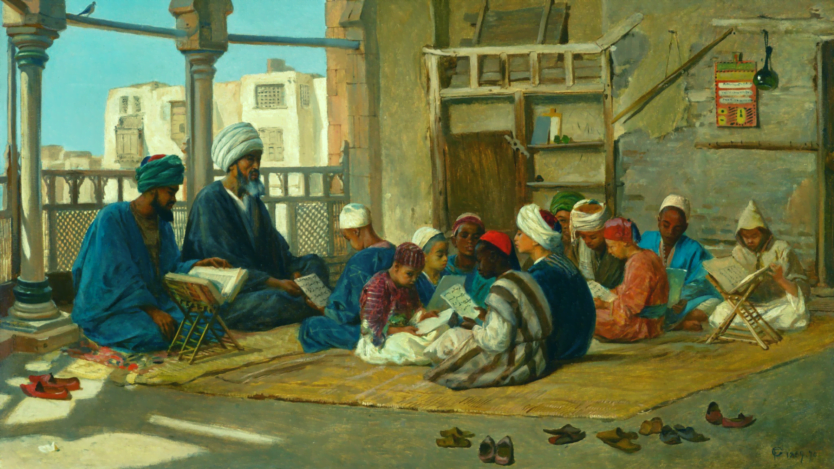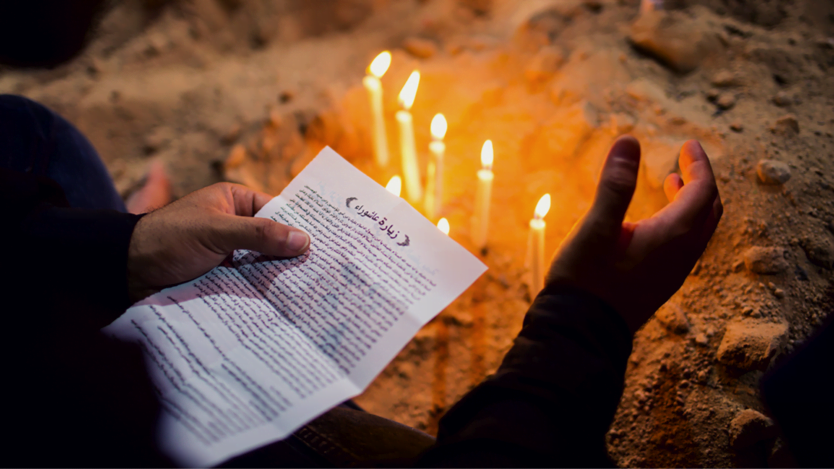
How Islam Was Hijacked
The last of the Prophets. The final message. The religion of Islam. Are you aware of the plots and schemes that took the place of epic proportions? This work uncovers the hidden reality of the most significant ideological hijacking to have ever taken place in all of history.
Read More
How Islam Was Hijacked
In this famous 100 hours lecture series of His Eminence Sheikh al-Habib, he discusses the age-old agenda of some from humanity to vie with the Divine Will of God in their attempts to claim ownership and distort the original Divinely revealed belief system. The Sheikh analyses the events and central figures in Islamic history that played a role in forming the two main denominations, Shi’a and ‘Sunni’. The series uncovers the conspiracy to hijack Islam to attain leadership and create a pagan-inspired, expansionist, and autocratic religion. All to subjugate the minds and wills of the masses and secure misappropriated positions of authority. The Sheikh elaborates in detail their motives from the start of the Islamic call, their meticulous plans, and how they eventually managed to achieve their cunning and corruptive goals, leading us into the second age of ignorance the Muslims exist in today. We discover the undeniably clear texts that exist within ‘Sunni’ scripture, revealing this coup and their cunning methods to attempt to justify their acts. A mixture of misinterpreting holy texts and fabricating violent, degrading, and inappropriate stories and attributing them to the Prophet Muhammad himself (peace be upon him and his family) to make their own ugly acts appear less unattractive. Discover the biggest betrayal in history to the last and greatest of the Prophets.

Liberation Of The Shi’a Individual
An attempt to instil the values and principles of Shi’a Islam as taught by the Ahlul-Bayt (peace be upon them), to allow for a future prosperous Shi’a nation. A must-watch for every Shi’a individual.
Read More
Liberation Of The Shi’a Individual
In this revolutionary series, His Eminence Sheikh al-Habib presents narrations and guidelines deduced from the teachings of the Pure Family of the Prophet (peace be upon them) on the ideal characteristics that a Shi’a individual must adorn themselves. His Eminence contrasts this to the current Shi’a climate that has come about through a prolonged negative historical context. Through this, the Sheikh sheds light on the psychological barriers and religious fallacies that have prevented the ordinary Shi’a individual from personal growth, vision, ambition, the advancement of Shi’a resourcefulness in various fields, and progress of the Shi’a religion as a whole.

The Atheist Delusion
Atheism presents itself as the new go-to worldview. However, as Sheikh al-Habib demonstrates, under scrutiny, Atheism seemingly cannot uphold its claims.
Read More
The Atheist Delusion
Did the universe come to existence by chance? Or is there an ‘intelligent designer’ that brought about our reality through will? Is science at war with religion? Does religion lay the basis of misguided morality, or does it justify the very existence of the concept of morality? If so, why is there so much perceived suffering in the world?
Inclinations to the denial of the Creator, rejection of religions as a source of guidance and the advocacy of subjective and fluctuating morality are phenomenons that are gaining traction in modern times. With New Atheism on the rise, it presents various arguments challenging God and religion. Sheikh al-Habib gives us a summary overview of how the religion of Islam does and always has contained the answers

The Lie Of The Justice Of The Companions
Sheikh al-Habib deconstructs the belief known as ‘The Justice of the Companions’. An idea spurred on by those who refer to themselves as ‘’Ahlul-Sunnah’’, used to legitimise those who betrayed the Prophet.
Read More
The Lie Of The Justice Of The Companions
An entire religion that stands on the unrealistic belief of ‘The Justice of the Companions’. Remove this, and the entire religion collapses. The scholars of ‘Sunnism’ are aware of this fact, hence their vehement attempts at defending this dogmatic belief. Before even analysing the idea, one has no option but to be highly sceptical or even strategy amused from its mere description. Can it be that all the Prophet’s companions (peace be upon him and his family) who on the apparent remained upon Islam be just? And their understanding of the religion a proof over us? Sheikh al-Habib walks you through the lives of those who they claim to be just and whom we are supposedly obliged to take our understanding of the religion. The Sheikh will also assess the scriptural evidence in the Qur’an and Hadith to see if they align with this claim.

Five Jurisprudential Principles
Sheikh al-Habib explains five common and essential jurisprudential rulings that every Shi’a should know, based on the rulings of Sayed Sadiq al-Shirazi. These five principles include:
- First principle: One is not to repeat the prayer except under five circumstances.
- Second principle: That one judges his actions as being acceptable in the case of doubting their legitimacy.
- Third principle: Converting to Islam nullifies previous sins.
- Fourth principle: Concluding the prayer and performing two post-prayer prostrations in the case of being unsure whether one has completed the third or fourth rak’aa.
- Fifth principle: When one prays the prayers that include four rak’aat (bowings to God) and one is unsure regarding the number of rak’aats prayed, one should prioritise the higher number. For example, if unsure between completing three or four rak’aat one should conclude that one has carried out four.

Responding To The Uproar Of A’isha's Supporters
His Eminence Sheikh al-Habib responds to critics’ uproar caused by the initial televised celebration of A’isha’s death.
Read More
Responding To The Uproar Of A’isha’s Supporters
The blessed celebration whereby we are joyous on the death anniversary of God’s enemy A’isha (may God’s damnation be upon her) is a part of our tradition; as the religion instructs us to be joyous upon the death of a tyrant.
Upon the first-ever televised celebration of the death of A’isha, Sheikh al-Habib received large numbers of criticisms, backlash and insults; from both Shi’a and non-Shi’a. First of all, one must thank God for this uproar, as it allows for directing the public attention to the critical topic of addressing who the killers of the Ahl-ul-Bayt are (peace be upon them). In this series, the Sheikh selects from the large volume of displeased supporters of A’isha and responds to them with clarity through evidence from the Qur’an and hadith.

Lessons On The Science Of Hadith
Learn how the scholars identify authentic reports and differentiate them from weak ones.
Read More
Lessons On The Science Of Hadith
Linguists have written books in which they have collected words with their meanings and books explaining Arabic grammar, such as morphology and grammar. The Shi’a Muslims have written such books as hadith compilations, hadith narrators biographies, and books for hadith criticism. The first type contained beliefs and prophecies, obligations and prohibitions, and types of actions carried out by the infallible. The second type includes the narrators’ names and attributes, referred to as the science of Rijal. The third type relates to the general systems and rules for identifying authentic hadith, referred to as the knowledge of diraya. The purpose of these three types is one, which is to prove the infallabes’ (peace be upon them) Sunnah in the correct manner.

Building A Personality Of The Future
How should one act per the narrations of the Ahlul-Bayt?
Read More
Building A Personality Of The Future
Sheikh al-Habib tackles various characteristics and personality traits that the religion of Islam, Prophet Muhammad and the Ahl-ul-Bayt (peace be upon them all) have taught us. These traits allow one to grow into their best potential selves and attain the highest status in the eyes of God. They also allow one to overcome trials, as well as Satanic influence. Such individuals lead the way in aiding the religion and directing the world towards religious and social harmony.

The Divinely Inspired Actions Of Imam Hussain
The Hussaini Nights – 1431 AH: On what did Imam Hussain (peace be upon him) base his actions?
Read More
The Divinely Inspired Actions Of Imam Hussain
The infallibles’ act per the will of God and not their desires. These lectures present the narrations whereby the infallibles are clearly shown what they must do and carry out to complete their mission in this worldly life.

The Tragic Killing Of Lady Fatima
The Nights Of Fatimiya: A historical analysis of the tragic killing of our Lady Fatima (peace be upon her).
Read More
The Tragic Killing Of Lady Fatima
Learn about the three narrations that mention when Our Lady was martyred and hear Sheikh al-Habib’s conclusion about what narrations are the most authentic in that regard. Learn about why The Commander of the Faithful, Imam Ali, buried Our Lady at night in private (peace be upon them both).

Quranic Research
‘Do they not then reflect on the Qur’an? Or are there locks upon their hearts?’ – Chapter 47, verse 24
Reflecting upon the verses that we read is something the Holy Qur’an has asked us to do and therefore, a religious obligation. This series delves into the meanings behind some of the ambiguous verses and also responds to some misconceptions posed by disbelievers such as Ahmad al-Qobanchi in his criticism of the Holy Qur’an.

Imam Kadhim And The Abbasid Dynasty
The Nights Of Kadhimiya: Learn about how the Abbasid dynasty tried to tarnish the image of Imam al-Kadhim (peace be upon him) and their attempts to justify their actions.
Read More
Imam Kadhim And The Abbasid Dynasty
Al-Mahdi al-Abbasi and Harun al-Abbasi imprisoned our Imam (peace be upon him) six times and finally killed him via poison. Despite this harsh life, how did our Imam live, and how did he treat the ones who wronged him? During his life, the Imam also met one of Umar ibn al-Khattab’s grandchildren, how did he treat the Imam, and how did the Imam treat him?

Sheikh al-Habib's English Lectures
Three lectures in English surrounding essential matters of religion.
Read More
Sheikh al-Habib’s English Lectures
- Lecture 1: Who killed the Prophet Muhammad
- Lecture 2: Why do the Shi’a hate Umar ibn al-Khattab
- Lecture 3: Imam Hussain – The Miracle of Islam

The Secrets Of The Event Of Karbala
The Nights of Hussainiya – 1433 AH: Ten lectures during the month of Muharram on Imam Hussain (peace be upon him) and the tragic event of The Battle of Karbala.
Read More
The Secrets Of The Event Of Karbala
- Lecture 1: The axis of polarization.
- Lecture 2: The betrayal of relatives.
- Lecture 3: The retrograde purification.
- Lecture 4: Resistance to promote prioritising ideals.
- Lecture 5: Summoning the certain death to discourage.
- Lecture 6: The path of risk and preparation
- Lecture 7: Husseini schism and Abbasi obedience
- Lecture 8: The end does not justify the means
- Lecture 9: Let us be with Imam Hussain (peace be upon him)
- Lecture 10: The Husseini revolution continues

The Life Of Imam Hassan
The Nights Of Hassaniya – 1433 AH: Five lectures about the life of Imam Hassan (peace be upon him)
Read More
The Life Of Imam Hassan
- Lecture 1: God’s gift to His Messenger.
- Lecture 2: A nation that disobeyed the Prophet
- Lecture 3: A plot against the Prophets grandchildren.
- Lecture 4: Ruggedness against the hypocrite.
- Lecture 5: Establishing the Imam’s legitimacy in peace and war.

The Loyalty Of The Companions of Imam Hussain
The Nights Of Hussainiya – 1432 AH: Discover the unmatchable steadfastness and loyalty of Imam Hussain’s companions (peace be upon him).
Read More
The Loyalty Of The Companions of Imam Hussain
The Sheikh speaks of the steadfastness of the companions of Imam Hussain (peace be upon him), as well as the danger of slogans that lead us away from Hussaini path. The Sheikh also defends ‘Tatbir’ (bloodletting ritual) in the religion of Shi’a Islam, addressing the various misconceptions.

Proving The Crimes Of A’isha
The Nights Of Ramadan – 1433 AH: Proving the crimes and obscenities of A’isha.
Read More
Proving The Crimes Of A’isha
This series presents a summarised version of A’isha’s crimes and obscenities. The series covers the most central evidence proving the condemnation of this personality. The evidence used is, as usual, taken from The Holy Qur’an, The Noble Prophetic Tradition and known historical accounts in the books of history and biography.

Irresponsible Claims Of Our Opposition
The Nights Of Ramadan – 1434 AH: Various topics tackling our opposition’s claims.
Read More
Irresponsible Claims Of Our Opposition
This series tackles various topics such as
- Protecting the status of the Prophet.
- The claim that the Prophet was forgetful.
- The claim that the Prophet made mistakes in his prayer.
- Addressing important topics relating to Abu Bakr.
- Addressing important topics relating to A’isha.

A Renewed Vision On The Pre-requisites Of A Ruling Cleric
The Sheikh explains his position on the permissibility of establishing a state based on Islamic principles.
Read More
A Renewed Vision On The Pre-requisites Of A Ruling Cleric
Sheikh al-Habib mentions the requirements for a ruler of a state based on Islamic principles and the methodology of implementation in the real world. He also argues why such a state is necessary and why states today claiming to be Islamic are far from it.

A Response To The Critics Of The Rafida Movement
A response to Shi’a and non-Shias that are against the Rafida Movement.
Read More
A Response To The Critics Of The Rafida Movement
The Sheikh presents a response to Shi’a and non-Shias against the Rafida methodology and Movement, based entirely upon narrations and previous scholars’ statements.

Do Not Be Deceived By The So-Called Companions
A series that clarifies the actual status of some of the Prophet’s well-known companions (peace be upon him and his family).
Read More
Do Not Be Deceived By The So-Called Companions
‘’My companions are like the stars, whichever star you follow you shall be guided’’. Narrations like these, falsely attributed to the Prophet, have given many lay Muslims a false image of all companions being just. We must recognise that the previous regimes that took over the Islamic nation after the Prophet’s martyrdom were people of misguidance and chasers of worldly desires. Many companions are protected from criticism under the guise of ‘they are companions and so do not criticise them’. Through this, they wish for their sanctity to become mandatory no matter what actions they committed. Sheikh al-Habib clears the mist on this topic.

The Satanic Files
The Nights Of Ramadan: The Satan. One of the main enemies of a believer, yet his reality is unknown to most.
Read More
The Satanic Files
A classical poem on Satan:
Your cunning enemy, do you know him well?
Do you know his inception and history?
Do you know his way of thinking?
What are his successes and failures?
Who are his most prominent aides?
What are the most prominent of his plots and traps?








